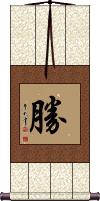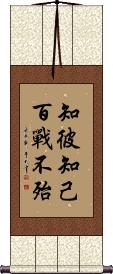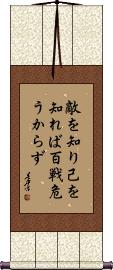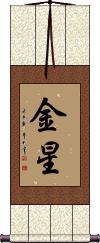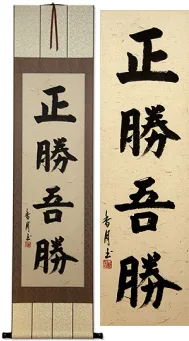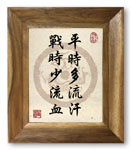Many custom options...
And formats...

Win Victory in Chinese / Japanese...
Buy a Win Victory calligraphy wall scroll here!
Personalize your custom “Win Victory” project by clicking the button next to your favorite “Win Victory” title below...
3. Know Your Enemy, Know Yourself, and You Cannot Lose
Win / Victory
勝 is a single character that means to win or be victorious.
This can also be translated: To overcome; success; to beat; to defeat; to surpass; superior to; to get the better of; better than; surpassing; superb.
In another context, this can mean beautiful (scenery); scenic spot; or scenic beauty.
In Taiwanese Mandarin, this can be pronounced with the first tone (sheng1) and mean: Able to bear; equal to (a task).
In Japan, this can also be the name Masaru.
In Korea, this has the same meaning but can also be the surname Sŭng.
Bloodless Victory
Perhaps a pacifist view or perhaps the best kind of victory; 兵不血刃 reflect this idea:
The edges of the swords not being stained with blood.
You could also translate it as: Win victory without firing a shot.
The first character means army or force. The second character means without or none. The last two characters mean bloodstained knives. So it represents a returning victorious army without bloodstained knives. 兵不血刃 is the very literal sense of this Chinese proverb. The title definition is more accurate to the way this proverb is understood.
Asking yourself why the direct or literal translation is different?
...Think of compound words in English such as “nevertheless” if we break it apart to “never the less,” we will have trouble getting the real definition of “in spite of that.” Similar things happen when multiple characters create a compounded word in Chinese.
Know Your Enemy, Know Yourself, and You Cannot Lose
知彼知己百戰不殆 is from Sun Tzu's (Sunzi's) Art of War. It means that if you know and understand the enemy, you also know yourself, and thus with this complete understanding, you cannot lose.
This proverb is often somewhat directly translated as “Know the enemy and know yourself, and you can fight a hundred battles without defeat.”
It can also be translated as “If you know both yourself and your enemy, you can come out of hundreds of battles without danger,” or “Know your enemy, know yourself, and your victory will not be threatened.”
Know Your Enemy, Know Yourself, and Win 100 Battles
敵を知り己を知れば百戦危うからず is the longer/full Japanese version of this proverb. This means “Know your enemy, know yourself, and you will not fear a hundred battles.”
Others will translate this as “Know thy enemy, know thyself, yields victory in one hundred battles.”
Note: Because this selection contains some special Japanese Hiragana characters, it should be written by a Japanese calligrapher.
Venus / Gold Star
金星 literally means gold star. Most of the time, in the context of the sky, this refers to the planet Venus.
Away from the sky, this can refer to a dazzling victory (e.g. win of a rank-and-file wrestler over the grand champion) or be the Japanese surname Kinboshi.
In the Buddhist context, this is Śukra, from Sanskrit for the planet Venus.
Drain the pond to get all the fish
Kill the goose that lays the golden eggs
In 632 BC, Duke Wen of the Kingdom of Jin was about to lead an army against the forces of the Kingdom of Chu.
The Duke asked one of his advisers, Jiu Fan, how they could win the impending battle, as they were drastically outnumbered.
Jiu Fan said, “All is fair in war,” and suggested a plan of dishonorable tactics (cheating).
The Duke was unsure of this advice, so he asked another adviser, Yong Ji, who replied, “If you catch fish by draining the pond, you can certainly get all the fish. But there will be no fish the following year. You can cheat this one time in battle, but such tactics can only be used once, as the enemy will be wise in future encounters.”
The Duke heard the words of his wiser adviser but cheated to gain victory in the battle. However, he rewarded Yong Ji more than Jiu Fan at the victory celebration, stating that while Jiu Fan's advice gained one victory, the wise words of Yong Ji would last forever.
This Chinese idiom/proverb is still used, over 2600 years later to remind people not to burn bridges, cheat, or dishonor themselves in exchange for a short-term gain while sacrificing the future.
竭澤而漁 is very similar to the meaning of the English phrase, “Kill the goose that lays the golden eggs.”
This in-stock artwork might be what you are looking for, and ships right away...
Gallery Price: $200.00
Your Price: $122.88
Gallery Price: $200.00
Your Price: $122.88
Not the results for win victory that you were looking for?
Below are some entries from our dictionary that may match your win victory search...
| Characters If shown, 2nd row is Simp. Chinese |
Pronunciation Romanization |
Simple Dictionary Definition |
勝 胜 see styles |
shèng sheng4 sheng masaru まさる |
More info & calligraphy: Win / Victory(1) win; victory; (2) beautiful scenery; scenic spot; (suf,ctr) (3) (ant: 敗・2) counter for wins; (surname, female given name) Masaru jina, victorious, from ji, to overcome, surpass. |
金星 see styles |
jīn xīng jin1 xing1 chin hsing kinboshi きんぼし |
More info & calligraphy: Venus / Gold Star(1) dazzling victory; (2) {sumo} win of a rank-and-file wrestler over the grand champion; (surname) Kinboshi Śukra, the planet Venus. |
一勝 see styles |
kazuyoshi かずよし |
one win; one victory; (personal name) Kazuyoshi |
克つ see styles |
katsu かつ |
(v5t,vi) to win; to gain victory |
制勝 制胜 see styles |
zhì shèng zhi4 sheng4 chih sheng seikatsu / sekatsu せいかつ |
to win; to prevail; to come out on top (noun/participle) victory; championship; (given name) Seikatsu |
勝つ see styles |
katsu かつ |
(v5t,vi) to win; to gain victory |
勝出 胜出 see styles |
shèng chū sheng4 chu1 sheng ch`u sheng chu |
to come out on top; to win (in an election, contest etc); success; victory |
勝利 胜利 see styles |
shèng lì sheng4 li4 sheng li masatoshi まさとし |
victory; CL:個|个[ge4] (noun/participle) victory; triumph; conquest; success; win; (male given name) Masatoshi excellent benefit |
勝機 see styles |
shouki / shoki しょうき |
chance to win; opportunity to win; chance of victory |
勝訴 胜诉 see styles |
shèng sù sheng4 su4 sheng su shouso / shoso しょうそ |
to win a court case (n,vs,vi) (ant: 敗訴) winning a (legal) case; victory (in a legal case) |
告捷 see styles |
gào jié gao4 jie2 kao chieh |
to win; to be victorious; to report a victory |
大勝 大胜 see styles |
dà shèng da4 sheng4 ta sheng daikatsu だいかつ |
to defeat decisively; to win decisively; great victory; triumph (n,vs,vi,adj-no) great victory; crushing victory; (surname) Daikatsu |
完勝 完胜 see styles |
wán shèng wan2 sheng4 wan sheng kanshou / kansho かんしょう |
to score a convincing win; to crush (one's opponent) (n,vs,vi) complete victory; total victory; (given name) Sadakatsu |
捷利 see styles |
jié lì jie2 li4 chieh li katsutoshi かつとし |
(noun/participle) victory; triumph; conquest; success; win; (male given name) Katsutoshi intelligent |
穩勝 稳胜 see styles |
wěn shèng wen3 sheng4 wen sheng |
to beat comfortably; to win easily; abbr. for 穩操勝券|稳操胜券, to have victory within one's grasp |
贏つ see styles |
katsu かつ |
(v5t,vi) to win; to gain victory |
躺贏 躺赢 see styles |
tǎng yíng tang3 ying2 t`ang ying tang ying |
to win without needing to even lift a finger; victory presented on a platter |
輸贏 输赢 see styles |
shū yíng shu1 ying2 shu ying yuei; shuei / yue; shue ゆえい; しゅえい |
win or loss; outcome gain or loss; victory or defeat |
大勝ち see styles |
oogachi おおがち |
(n,vs,vi) great victory; big win; huge profit; killing |
大勝利 大胜利 see styles |
dà shèng lì da4 sheng4 li4 ta sheng li daishouri / daishori だいしょうり |
huge win; overwhelming victory great reward |
勝ちとる see styles |
kachitoru かちとる |
(transitive verb) to exert oneself and win; to gain (victory) |
勝ち取る see styles |
kachitoru かちとる |
(transitive verb) to exert oneself and win; to gain (victory) |
大獲全勝 大获全胜 see styles |
dà huò quán shèng da4 huo4 quan2 sheng4 ta huo ch`üan sheng ta huo chüan sheng |
to seize total victory (idiom); an overwhelming victory; to win by a landslide (in election) |
旗開得勝 旗开得胜 see styles |
qí kāi dé shèng qi2 kai1 de2 sheng4 ch`i k`ai te sheng chi kai te sheng |
lit. to win a victory on raising the flag (idiom); fig. to start on something and have immediate success; success in a single move |
逆転勝利 see styles |
gyakutenshouri / gyakutenshori ぎゃくてんしょうり |
come-from-behind victory; comeback win |
Variations: |
isshou / issho いっしょう |
one win; one victory |
これで勝つる see styles |
koredekatsuru これでかつる |
(expression) (net-sl) victory is mine; with this, I'll win |
勝利を収める see styles |
shourioosameru / shorioosameru しょうりをおさめる |
(exp,v1) to gain a victory; to win |
Variations: |
in; uin ウィン; ウイン |
win; victory |
ストレート勝ち see styles |
sutoreetogachi ストレートがち |
{sports} straight-sets victory; straight-set win |
Click here for more win victory results from our dictionary
The following table may be helpful for those studying Chinese or Japanese...
| Title | Characters | Romaji (Romanized Japanese) | Various forms of Romanized Chinese | |
| Win Victory | 勝 胜 | shou / sho | shèng / sheng4 / sheng | |
| Bloodless Victory | 兵不血刃 | bīng bù xuè rèn bing1 bu4 xue4 ren4 bing bu xue ren bingbuxueren | ping pu hsüeh jen pingpuhsüehjen |
|
| Know Your Enemy, Know Yourself, and You Cannot Lose | 知彼知己百戰不殆 知彼知己百战不殆 | zhí bǐ zhí jī bǎi zhàn bú dài zhi2 bi3 zhi2 ji1 bai3 zhan4 bu2 dai4 zhi bi zhi ji bai zhan bu dai zhibizhijibaizhanbudai | chih pi chih chi pai chan pu tai | |
| Know Your Enemy, Know Yourself, and Win 100 Battles | 敵を知り己を知れば百戦危うからず | teki o shi ri o no o shi re ba hya ku sen aya u ka ra zu | ||
| Venus Gold Star | 金星 | kinboshi / kinsei | jīn xīng / jin1 xing1 / jin xing / jinxing | chin hsing / chinhsing |
| Drain the pond to get all the fish | 竭澤而漁 竭泽而渔 | jié zé ér yú jie2 ze2 er2 yu2 jie ze er yu jiezeeryu | chieh tse erh yü chiehtseerhyü |
|
| In some entries above you will see that characters have different versions above and below a line. In these cases, the characters above the line are Traditional Chinese, while the ones below are Simplified Chinese. | ||||
Successful Chinese Character and Japanese Kanji calligraphy searches within the last few hours...
